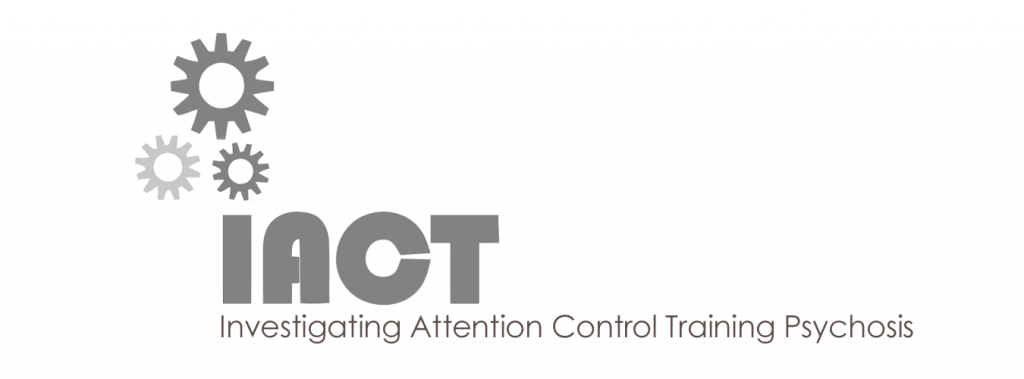
iACT – Investigating Attention Control Training in Psychosis
Thank you for finding out more about the iACT trial. Unfortunately the iACT Trial has now closed for recruitment, however please read on for further information about the trial
A common problem described by people with psychosis is that they describe excessive self-focused attention (Perona-Garcelan, et. al., 2008; Cangas, et. al., 2006) and being trapped in unhelpful thinking patterns that they experience as out of their control. The metacognitive model asserts that as a result, attentional control becomes inflexible and the person is absorbed in perseverative, self-focused, worry based processing and threat-monitoring. This is known as the Cognitive Attentional Syndrome (CAS). If attention is brought away, the CAS is interrupted and metacognitive control becomes stronger and flexible.
Attention training is one specific treatment technique developed by Wells (1990) for use in metacognitive therapy aimed to increase awareness of the flexible control that people have over thoughts and other internal experiences. Whilst this technique was originally developed to be a part of metacognitive treatment, studies have suggested that it can have some positive benefits on anxiety and depression when practiced as a stand-alone strategy (Wells, 1990; Wells, et. al., 1997; Papageorgiou & Wells, 2000).
More recently studies suggest that attention training is promising in the treatment of auditory and visual hallucinations in psychosis (Valmaggia, et. al., 2007; Hutton, et. al., 2012) along with other psychosis symptoms (Levaux, et. al., 2013), and a recent trial has shown that reduction of worry in people with persecutory ideation also led to reductions in paranoia (Freeman, et al., 2015). Furthermore, metacognitive therapy (MCT), as a treatment for psychosis, has shown itself to be safe and acceptable, with reductions in symptoms observed at the end of therapy (9-months) and follow-up (12-months) (Morrison, 2014).
The iACT (Investigating Attention Control Training in Psychosis) trial is the first randomised controlled trial investigating whether an eight week intervention of attention training (ATT) is helpful for people who experience psychosis. The trial was set up as a pilot study to be able to test whether ATT is a feasible and acceptable technique to help people who are distressed by experiences such as hallucinations and/or unusual beliefs. For those randomised to receive ATT, participants were asked to participate across the eight-week intervention. Participants were guided by trained staff to practice the technique and to disengage from unhelpful coping strategies such as worry, rumination and threat monitoring that can drive or maintain experiences such as hallucinations and unusual beliefs.
The iACT trial has now finished recruitment and 29 participants were randomised to receive either ATT plus TAU (Treatment As Usual) or TAU alone. The results are currently being finalised and written-up to be published in a scientific peer-review journal. A summary of the main findings were as follows. As a measure of acceptability the number of ATT sessions participants took part in were looked at and this was high. Retention rates (those who stayed in the trial for follow-up appointments) across the trial follow-up periods (8-week and 12-week) suggest a larger trial is feasible. Preliminary analyses suggest those participants that received the intervention achieved a significant reduction in symptoms of psychosis and engage in less unhelpful coping strategies to manage their experiences. The results should be available in the next 12 months.
For more information about the iACT trial please download the information sheets below. For further information about ATT and the related studies please visit the metacognitive therapy institute website HERE
Referrer’s Leaflet | Participant Leaflet | Participant Information Sheet
To find out more about iACT please Contact Sophie Parker at PRU


